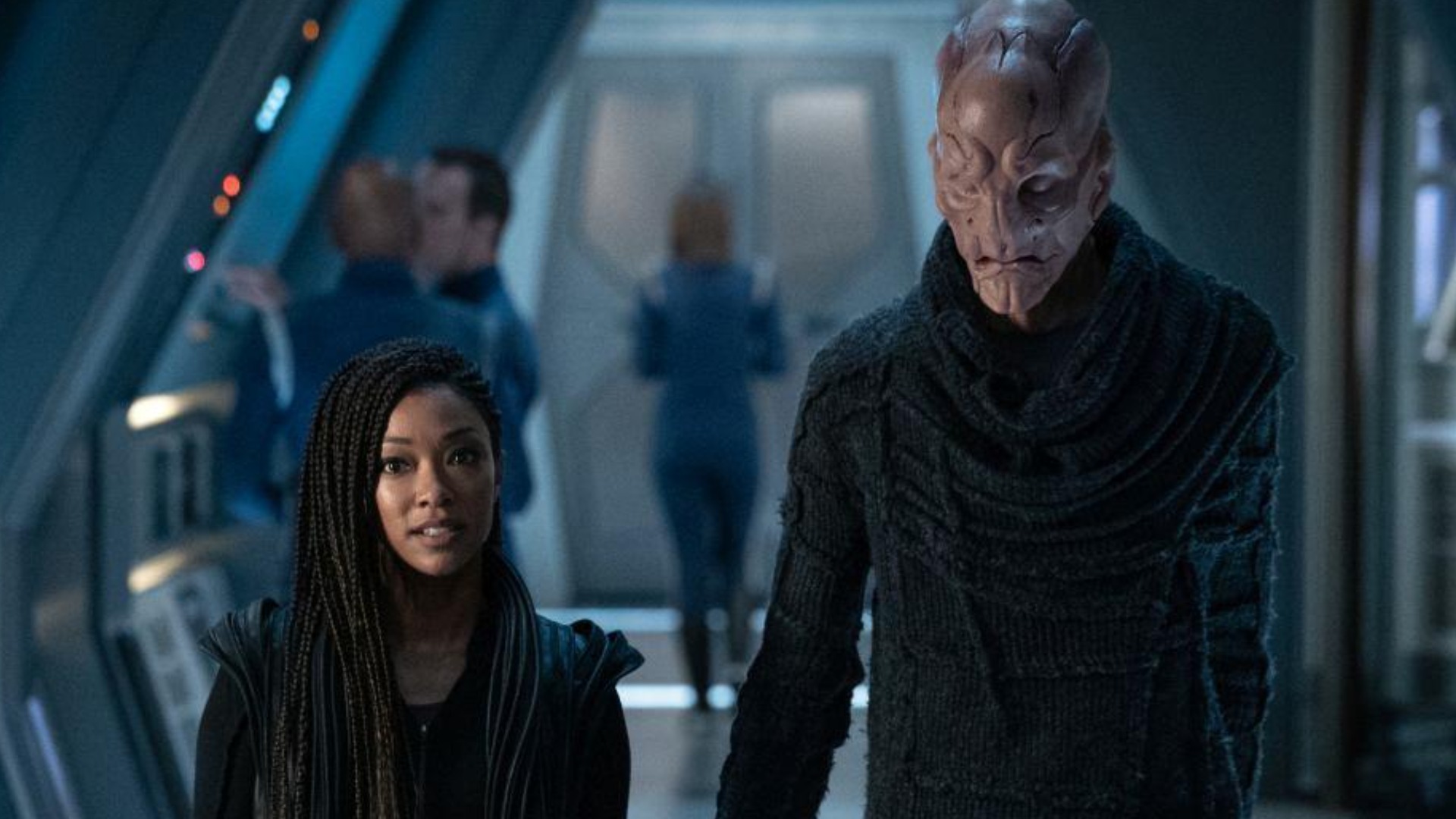GamesRadar+ Verdict
Politically relevant – if a little contrived – this episode is where the building blocks for the season start to fall into place.
Why you can trust GamesRadar+
Warning: This Star Trek: Discovery season 3, episode 3 review contains major spoilers – many of them set to stun. Boldly go further at your own risk…
Political allegory has always been as big a part of the Star Trek formula as exploring strange new worlds and seeking out new life and new civilisations. From the civil rights movement of the '60s to the end of the Cold War and beyond, Trek has frequently used its futuristic, outer-space setting to point a microscope on society – but rarely as blatantly as it does here.
In fact, "People of Earth" features so many allusions to Brexit and Trump-style isolationism that it could easily be retitled "Make Earth Great Again". As the Discovery takes a detour to 32nd century Earth we’re introduced to a planet that’s completely reinvented itself since being the centre of the Federation. These days humanity has gone it alone, with the United Earth Defense Force seeing no reason to form alliances with other worlds when “We can look after ourselves”. The force-field that protects the planet from outside visitors is essentially a sci-fi-tinged allusion to a border wall, so it’s fairly clear where Trek’s writers stand on the current state of worlds politics – surely it can’t be a coincidence that the episode debuts just days ahead of the US Presidential election.
Now that Michael Burnham’s been reunited with her shipmates in suitably tearful style, a message from a Starfleet admiral renders one of Trek’s rare trips to humanity’s homeworld essential – even though the signal ceased transmission 12 years earlier. Never has Discovery’s unique spore drive been more convenient to the plot, as the fungal tech allows the journey across the galaxy to be completed in mere seconds.
The isolationist, post-Federation Earth is the last thing the Discovery crew expected to find, as the suspicious government insists on boarding the ship to investigate what’s on board. They’re surprised to find an unashamedly retro starship still operating as if it’s part of the Federation.
Of course, it turns out that, while it is possible to take a crew (nine centuries) out of Starfleet, you can’t take Starfleet out of the crew. With the Discovery sucked into Earth’s dilithium-fuelled dispute with robotic ‘alien’ invaders, Saru’s insistence on following traditional diplomatic protocols feels like a quaint anachronism in the 32nd century. Indeed, the episode’s only significant misstep comes when both sides realise that they’d understand each other much better if they put aside their differences and talked. Have they never seen an episode of Star Trek: The Next Generation? It’s a clunky resolution that feels totally at odds with the dark future Discovery now operates in. Having the wise heads of a starship making the universe better every week is a cliche-ridden path the show really needs to avoid.
The new-look Burnham offers hope that won’t be the case, however. Her year working as a courier in the 32nd century has changed her, softening some of her colder, Vulcan-esque edges and making her a more rounded, potentially unpredictable character. “In another world I might have said Michael was somewhere being earnest and doing the right thing,” Georgiou tells Book. “In this one, I’m not so sure.” Freed from the strait-jacket of a Starfleet uniform, she’s learned that there are other ways to live, that going by the book is not always the best course of action – even when it means embarking on rogue missions, without warning her captain first.
Her revised outlook should make her a brilliant foil for Saru, now that he’s been belatedly installed as Discovery’s permanent captain – the first alien character to sit in the big chair on a Star Trek show. With Saru as commanding officer, Burnham as his Number One and Georgiou to act as the devil on the shoulder (and provide a steady stream of pithy one-liners), Star Trek: Discovery may just have stumbled a lead trio with a dynamic to rival the classic Kirk/Spock/McCoy axis.
Elsewhere, Book already feels integral to the show - and not just because his ship’s cloaking device can be used to hide dilithium. While his debut in the season premiere saw him saddled with all the exposition, here he’s more relaxed and free to bring his easy Han Solo-esque charm to Discovery. The chemistry between Book and Burnham is also undeniable. If they don’t get together before the end of the season, we’ll be very surprised. Hopefully this time her boyfriend won’t turn out to be a brainwashed, murderous Klingon...
It’s also worth mentioning the debut of Blu del Barrio as Adira – a teenage officer on a Starfleet vessel who’s (thankfully) not giving off any Wesley Crusher vibes. This member of the United Earth Defense Force has a hidden side to their personality because – in a neat nod to Deep Space Nine – they’re the host of a Trill symbiont, who also happened to be the admiral who sent out that mysterious message. The Federation are clearly out there – but where?
New episodes of Star Trek: Discovery season 3 land on Thursdays on CBS All Access in the US, and on Fridays on Netflix in the UK.
Richard is a freelancer journalist and editor, and was once a physicist. Rich is the former editor of SFX Magazine, but has since gone freelance, writing for websites and publications including GamesRadar+, SFX, Total Film, and more. He also co-hosts the podcast, Robby the Robot's Waiting, which is focused on sci-fi and fantasy.



